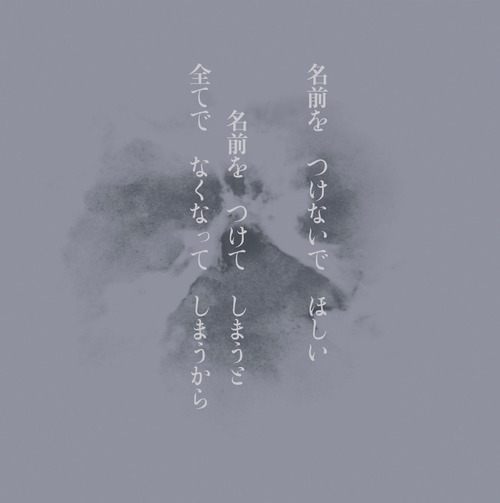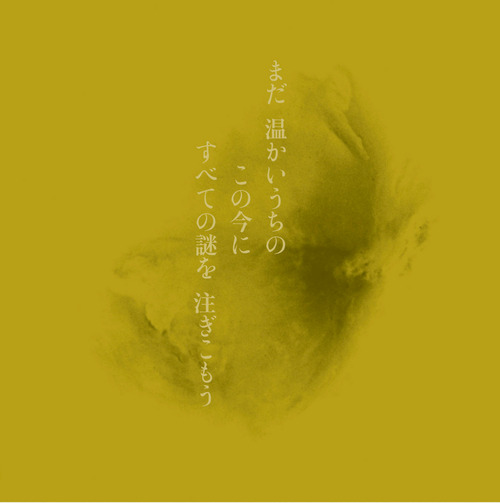Fushitsusha, "Please don't name it,..." and "In the now,..."
 When Keiji Haino reignited the fires at the center of Fushitsusha that had lain dormant for about a decade, it was inevitable that a change of focus would occur in the group’s music. Two albums recorded for Heartfast in 2012 saw the gaping chasms of noisy rock dropped for something more angular and rhythmically challenging. A third album was promised but, Haino being Haino, this has expanded the series further to become a tetralogy with these two releases.
When Keiji Haino reignited the fires at the center of Fushitsusha that had lain dormant for about a decade, it was inevitable that a change of focus would occur in the group’s music. Two albums recorded for Heartfast in 2012 saw the gaping chasms of noisy rock dropped for something more angular and rhythmically challenging. A third album was promised but, Haino being Haino, this has expanded the series further to become a tetralogy with these two releases.
 
Both discs were recorded at the same time with the latest line up of Fushitsusha with Ryosuke Kiyasu on drums and Kamekawa Chiyo on bass who have been touring with Haino for the last couple of years (the line up who recorded the 2012 albums seemed to have been left at home early on). As a result, Kiyasu and Chiyo have had time and experience to delve deep into Haino’s methods and this is evident from the recordings here. This Fushitsusha feels lean and powerful, gone are the nulling voids of previous line ups and instead the music is tight and punchy.
On 名前を つけないで ほしい 名前 つけて しまうと 全てで なくなって しまうから (Please don't name it. If you name it, it will cease to become all), the group run through five tracks in about 15 minutes which is practically punk rock speeds for Fushitsusha. Haino’s guitar is still wild but seems less aggressive than before and I would almost (stress almost) suggest that "なしくずし" is one of his more accessible songs in a long time. Though I would hasten to add that it is accessible in the same way as The Velvet Underground’s "I Heard Her Call My Name" is accessible. Things get a bit more adventurous on "はれつしろ (No.1)," where an older sort of Fushitsusha vibe is channeled. Haino manages to tear the temporal relationships between his singing and his guitar playing apart without once letting either aspect of his performance fall into step with what the rest of the group are doing.
The demanding time signatures explored during their last couple of tours pop up on songs like "なぞらない" and "ここにあるものは あっちにあるときは…" (the album’s one long song which makes up about half the disc’s run time). Here, Kiyasu and Chiyo head into what at first seems like free improvisation but quickly reveals itself to be highly controlled and exacting rhythmic patterns. It takes a few listens to get adjusted to what they are doing but, once my brain has acclimatised to it, it becomes quite hypnotic. In particular, "ここにあるものは あっちにあるときは…" has such a gentle and restrained approach that makes the unusual structure of the piece seem less alien. The barely-there music makes it more theatrical, bringing to mind the precision and strangeness of Samuel Beckett.
samples:
 The second of these albums, まだ温かいうちの この今に 全ての謎を 注ぎ込んでしまおう (In the now, while it's still warm, let's pour in every mystery; the more observant reader might notice this is very similar in title to the latest Haino/Ambarchi/O’Rourke trio release) appears to be the same ideas explored from a different perspective. Two of the pieces have the same name (but numbered differently) with very little else in common. Given how Haino seemed to act as a conductor as much as a lead singer/guitarist during their show in Dublin a little while back, it would appear that these recordings might be the same philosophically even if the end results are different. "あいつの 名前をよぶな (No.2)" and "はれつしろ (No.2)" are both cut from the same cloth, a heavy prog feeling running through them as the three players all sound like they are playing a different freakout bit from three different 70s albums. It sounds tremendous.
The second of these albums, まだ温かいうちの この今に 全ての謎を 注ぎ込んでしまおう (In the now, while it's still warm, let's pour in every mystery; the more observant reader might notice this is very similar in title to the latest Haino/Ambarchi/O’Rourke trio release) appears to be the same ideas explored from a different perspective. Two of the pieces have the same name (but numbered differently) with very little else in common. Given how Haino seemed to act as a conductor as much as a lead singer/guitarist during their show in Dublin a little while back, it would appear that these recordings might be the same philosophically even if the end results are different. "あいつの 名前をよぶな (No.2)" and "はれつしろ (No.2)" are both cut from the same cloth, a heavy prog feeling running through them as the three players all sound like they are playing a different freakout bit from three different 70s albums. It sounds tremendous.
There is another change of direction on "ここになってしまう." They take a straight but distinctively non-rock rhythm (think Faust’s bit of their collaboration with Tony Conrad, Outside the Dream Syndicate) and on its skeletal frame, Haino hangs sparse vocals with a sense of detachment to match the music. However, the rest of the disc feels a little directionless; the out of time experimentation having run its course given that it was also present on the first album. Part of me feels that one great album could have been made out of the two sessions rather than a good and a not quite so good album. Perhaps part of my problem is that I have been listening to them back to back since I got them and should probably give them a bit of thinking space in between. In any case, a mediocre Fushitsusha album is worth ten albums by most other groups so once Haino keeps churning them out, I will be happy.
samples:
- ここになってしまう
- あいつの 名前をよぶな(No.2)
- さらに重くなってしまった罪
 



